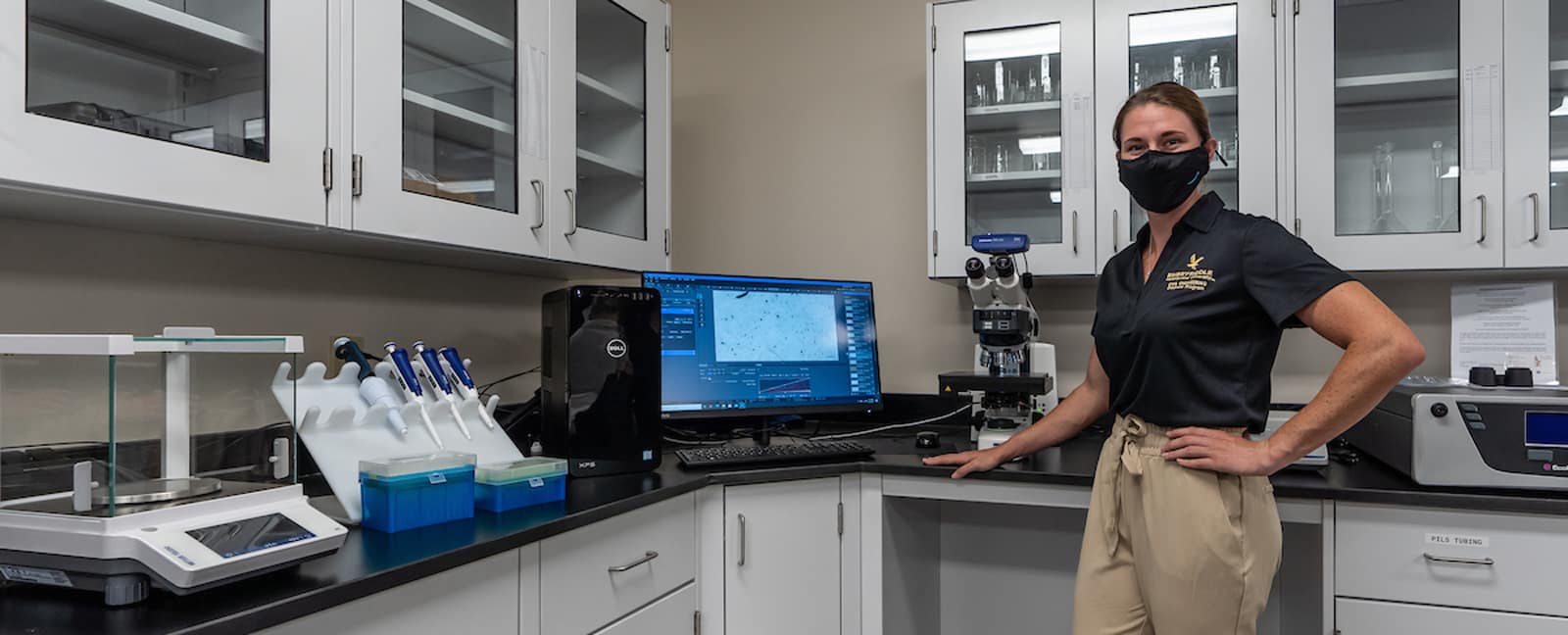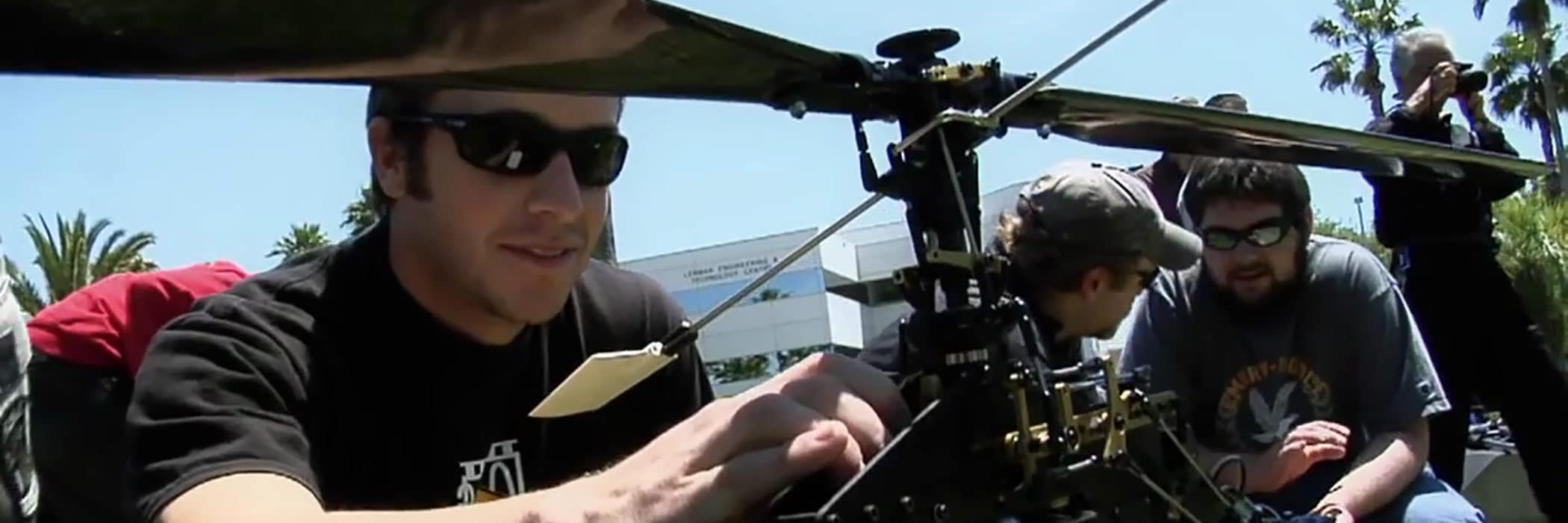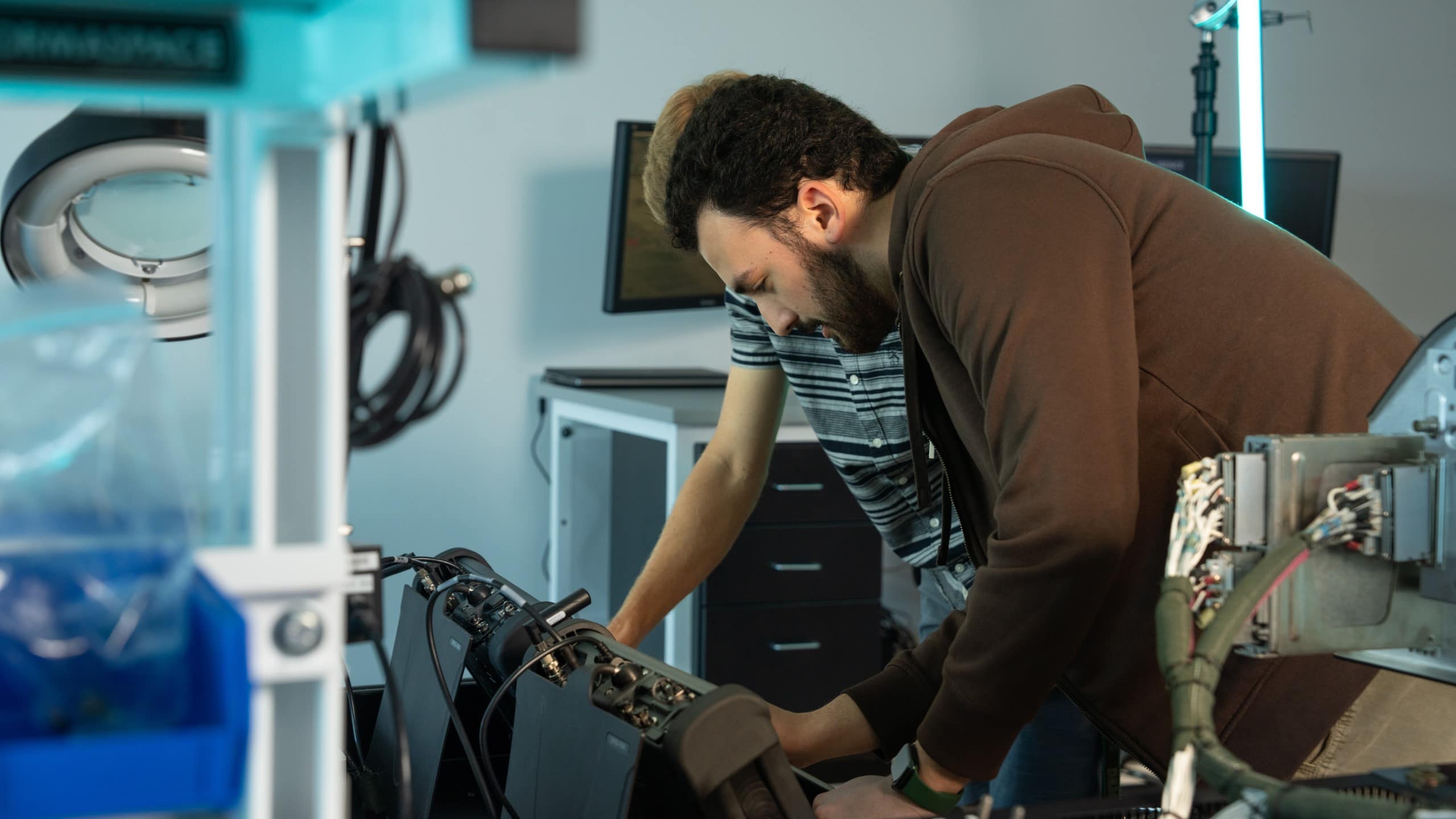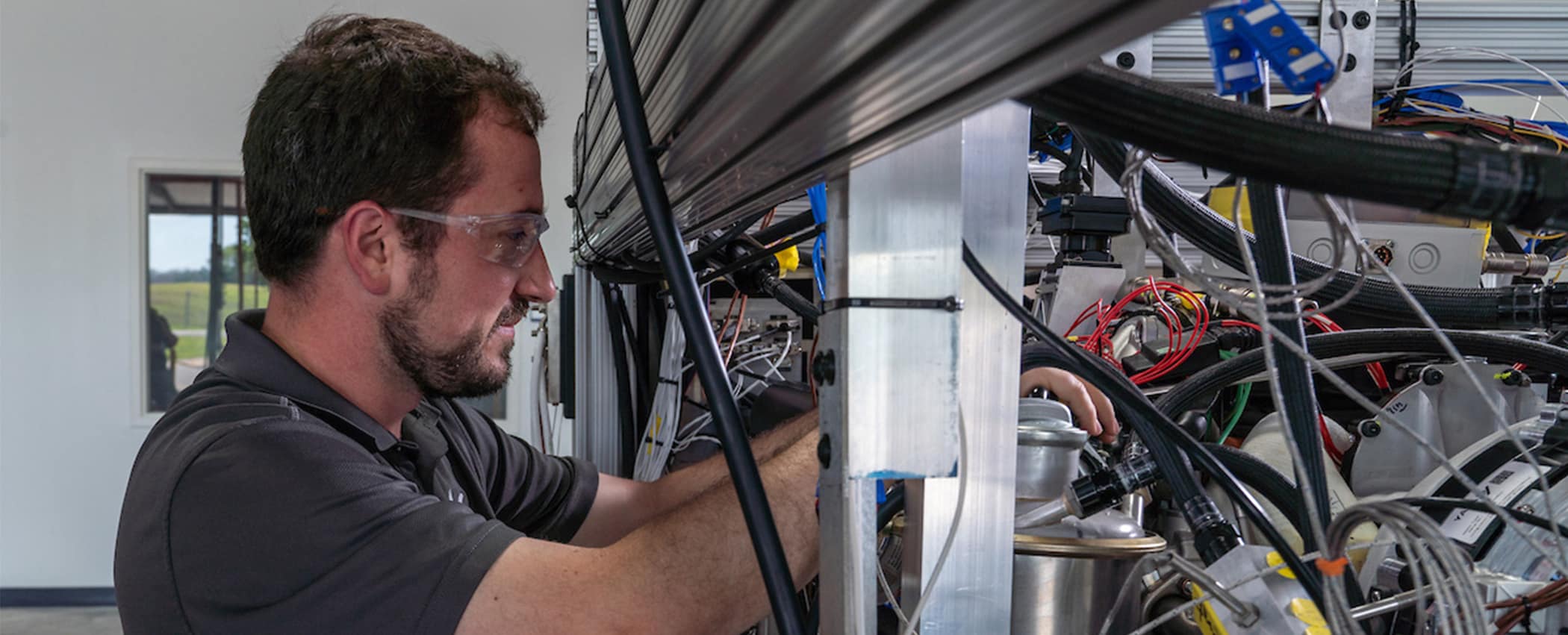
Master of Science in
Civil Engineering
Bringing aerospace technology to an established engineering field, this program creates a unique educational environment and offers a thesis or non-thesis track.
The Master of Science in Civil Engineering degree at Embry-Riddle is a practical, hands-on, research-oriented degree that enhances a graduate’s foundational knowledge of fields such as environmental, transportation, materials, geotechnical, and structural engineering.
Small class sizes and approachable faculty are advantages of the Civil Engineering program.
DETAILS
About Civil Engineering at the Daytona Beach, FL Campus
Civil engineers plan, design, and build the infrastructures on which we rely. At ERAU’s Daytona Beach Campus, we bring aerospace technology to this established engineering field, which results in a unique educational environment for students.
Housed in the Civil Engineering Department of the College of Engineering, the M.S. in Civil Engineering is a fully accredited degree that builds on undergraduate education. With disciplines in transportation, materials, geotechnical, and structural engineering, students can translate their academic accomplishments into opportunities, continuing the legacy of successful graduates entering the workforce.
- Select from a thesis or non-thesis track.
- Learn in a small and close-knit community with approachable, responsive staff and faculty.
- Conduct research in a variety of state-of-the-art labs, including the Aquaponics Lab where students could develop a sustainable food supply for a Mars colony; the various materials and testing labs where students can explore the strength of composites or concrete; and the Multimodal Intelligent Transportation Lab to plan and design improved airport traffic.
- Take advantage of our campus location, which is adjacent to the Daytona Beach International Airport and the NextGen Test Bed, and is also close to NASA and Kennedy Space Center.
Student Learning Outcomes
Students will:
- Analyze and design geotechnical objects/components for various infrastructure systems.
- Create geotechnical systems based on knowledge of advanced topics in geomechanics and geotechnical engineering, as appropriate to their chosen concentration.
- Communicate effectively on issues pertaining to geotechnical engineering.
Degree Requirements
The Master of Science in Civil Engineering is granted to students who complete the course work described below. Students may choose Non-Thesis or Thesis Option.
Non-Thesis Option
| CIV Required Courses | 12 | |
| Electives | 18 | |
| Total Credits | 30 | |
Thesis Option
| Civil Engineering Required Courses | 12 | |
| Electives | 9 | |
| Thesis Research (3 cr of CIV 700A plus 6 cr of Thesis Research) | 9 | |
| Total Credits | 30 | |
Transportation Engineering Track
| Required courses | 12 | |
CIV 506 | Transportation Systems Engineering | |
CIV 522 | Advanced Geometric Design of Highways and Streets | |
CIV 532 | Transportation Planning | |
CIV 602 | Transportation Safety | |
| Transportation Electives | 18 | |
| Max 12 credits outside CIV | ||
BA 511 | Operations Research | |
BA 514 | Strategic Marketing Management in Aviation | |
BA 604 | International Management and Aviation Policy | |
BA 645 | Airport Operations and Management | |
BA 650 | Airline/Airport Relations | |
BA 651 | Strategic Airport Planning | |
CIV 510 | Design and Analysis of Airfield and Highway Pavement | |
CIV 512 | Intelligent Transportation Systems | |
CIV 520 | Railroad Engineering and High Speed Rail | |
CIV 524 | Access Management | |
CIV 534 | Transportation Simulation and Modeling | |
CIV 604 | Advanced Signal Control and Design | |
DS 540 | Data Mining | |
HFS 600 | Human Factors in Systems | |
HFS 616 | Human Factors of Transportation | |
MA 505 | Statistics I | |
MA 506 | Probability and Statistical Inference | |
MSA 508 | Advanced Airport Modeling | |
MSA 511 | Earth Observation and Remote Sensing | |
MSA 540 | The Air Transportation System | |
MSA 554 | Project Management in Aviation Aerospace | |
MSA 662 | Statistical Analysis for Aviation/Aerospace | |
| Total Credits | 30 | |
Structural Engineering Track
| Required Courses | 12 | |
AE 514 | Introduction to the Finite Element Method | |
CIV 514 | Advanced Concrete Analysis and Design | |
CIV 516 | Advanced Steel Analysis and Design | |
CIV 526 | Advanced Foundation Engineering | |
| Structures Electives | 18 | |
| Max 9 credits outside CIV | ||
AE 502 | Strength and Fatigue of Materials | |
AE 510 | Aircraft Structural Dynamics | |
AE 523 | Linear Systems | |
AE 532 | Engineering Materials and Failure Analysis | |
CIV 502 | Wind Engineering | |
CIV 504 | Bridge Engineering | |
CIV 510 | Design and Analysis of Airfield and Highway Pavement | |
CIV 518 | Structural Reliability | |
CIV 528 | Structural Health Monitoring in Civil Infrastructure | |
CIV 530 | Composites in Civil Infrastructure | |
ME 525 | Structural Design Optimization | |
| Total Credits | 30 | |
General Civil Engineering Track
| Required Courses | 12 | |
CIV 506 | Transportation Systems Engineering | |
or CIV 532 | Transportation Planning | |
CIV 514 | Advanced Concrete Analysis and Design | |
or CIV 516 | Advanced Steel Analysis and Design | |
CIV 510 | Design and Analysis of Airfield and Highway Pavement | |
or CIV 526 | Advanced Foundation Engineering | |
CIV 508 | Environmental Engineering | |
| Civil Electives | 18 | |
| Non-Thesis Option: | ||
| CIV Graduate Electives (Advisor approved (6-18 credits) | ||
| Non-CIV Graduate Electives (Advisor approved) (0-12 credits) | ||
| Total Credits | 30 | |
Environmental Sustainability & Resilience Track
| Required Courses | 12 | |
CIV 508 | Environmental Engineering | |
or CIV 540 | Drainage Engineering | |
CIV 536 | Advanced Flood Modeling | |
or CIV 538 | Air Pollution Control | |
CIV 542 | Environmental Data Science | |
CIV 544 | Environmental Sustainability and Resilience | |
| General Electives | 9 | |
CEC 526 | Sensor Data Fusion | |
CEC 530 | Image Processing and Machine Vision | |
CIV 502 | Wind Engineering | |
CIV 526 | Advanced Foundation Engineering | |
CIV 528 | Structural Health Monitoring in Civil Infrastructure | |
DS 540 | Data Mining | |
DS 544 | Data Visualization | |
EP 501 | Numerical Methods for Engineers and Scientists | |
EP 708 | Remote Sensing: Active and Passive | |
EP 712 | Geophysical Fluid Dynamics | |
MA 506 | Probability and Statistical Inference | |
MA 553 | High Performance Scientific Computing | |
MA 588 | Numerical Methods in Fluids | |
ME 500 | Clean Energy Systems | |
MHSR 530 | Environmental Security | |
MHSR 540 | Foundations of Resilience | |
MSA 511 | Earth Observation and Remote Sensing | |
MSES 550 | Atmospheric Conditions in Emergency Services | |
RSCH 665 | Statistical Analysis | |
SFTY 530 | Safety, Health and Environmental Legislation, Litigation & Compliance | |
WEAX 517 | Advanced Meteorology | |
| Thesis | 9 | |
CIV 700 | Thesis | |
| Total Credits | 30 | |
Geomechanics & Geotechnical Engineering Track
| Required Courses | ||
| CIV 526 | Advanced Foundation Engineering | 3 |
| CIV 548 | Numerical Methods in Geotechnical Engineering | 3 |
| CIV 552 | Advanced Soil Mechanics | 3 |
| CIV 556 | Risk and Reliability in Geotechnical Engineering | 3 |
| Geomechanics & Geotechnical Engineering Electives | ||
| Max 9 credits outside CIV | ||
| AE 514 | Introduction to the Finite Element Method | 3 |
| CIV 502 | Wind Engineering | 3 |
| CIV 510 | Design and Analysis of Airfield and Highway Pavement | 3 |
| CIV 528 | Structural Health Monitoring in Civil Infrastructure | 3 |
| CIV 546 | Designing with Geosynthetics | 3 |
| CIV 550 | Unsaturated Soil Mechanics | 3 |
| CIV 554 | Soil Dynamics and Earthquake Engineering | 3 |
| DS 540 | Data Mining | 3 |
| DS 544 | Data Visualization | 3 |
| EP 501 | Numerical Methods for Engineers and Scientists | 3 |
| EP 708 | Remote Sensing: Active and Passive | 3 |
| EP 712 | Geophysical Fluid Dynamics | 3 |
| MA 506 | Probability and Statistical Inference | 3 |
| MA 553 | High Performance Scientific Computing | 3 |
| MA 588 | Numerical Methods in Fluids | 3 |
| MSA 511 | Earth Observation and Remote Sensing | 3 |
| MHSR 530 | Environmental Security | 3 |
| MHSR 540 | Foundations of Resilience | 3 |
| Total Credits | 30 | |
Get Started Now:
Summary
30 Credits
Estimate your tuition by using the Tuition Calculator
View Financial Aid Information
Learn about our General Education
Find out about transferring credits to this degree
Learn more about our Veterans & Military benefits
View our Academic Calendar











